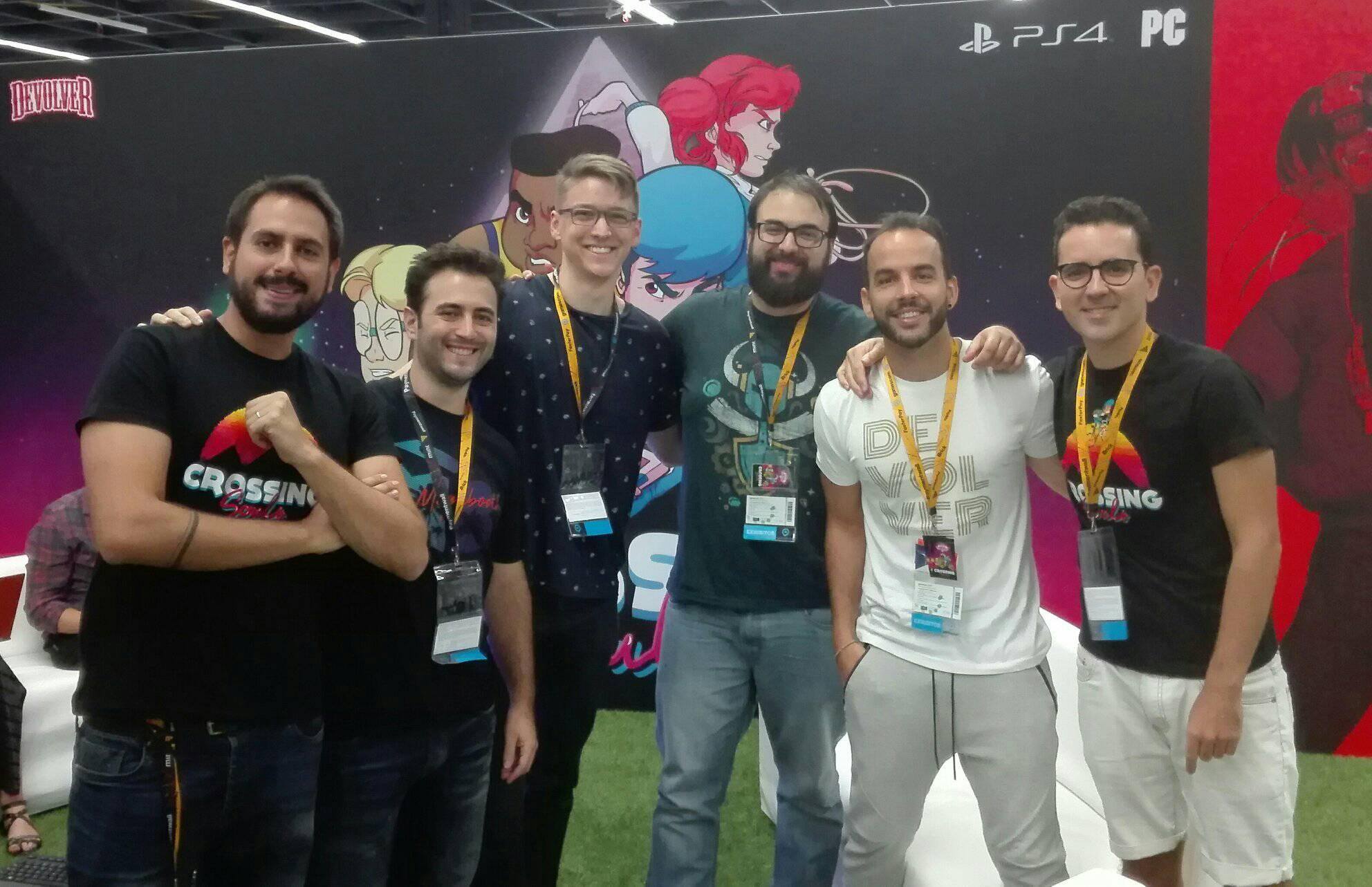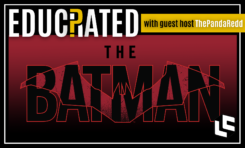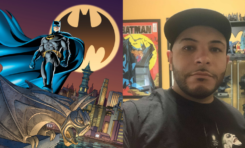Loot Play is in full swing, and today we’re happy to bring you an interview with none other than Fourattic, the incredible team behind this month’s featured title, Crossing Souls! Fourattic is a small indie studio based out of Spain, and comprised of some of the most passionate and hardworking game devs I’ve ever had the pleasure of talking to – we sat down with three of them for this chat, take a look!
Hello Fourattic – thank you so much for taking time for this interview! Before we get started, why don’t you introduce yourselves and let us know what you do at Fourattic?
Juan Diego: Hi there! It’s a pleasure to be part of Loot Play! Fourattic is a team based in sunny Seville, Spain and formed by 5 members:
– Juan Diego Vázquez: Programmer and game designer. Mainly focused on gameplay and mechanics.
– Daniel Benítez: Art direction and game designer. Creating awesome pixel art and environments.
– Juan Gabriel Jaén (Juanga): Animation direction and game designer. Also the artist behind those 80’s cutscenes.
– Alfonso Cueto: Programmer. Helping with awesome tools and localization.
– Fernando de Luna: Programmer. Working on enemies and supporting the team.
Although the main team is working together in Seville we’ve also worked with several collaborators who helped us a lot during the process of creating the game: Chris Kobke is the creator of the “John Williams-style” soundtrack. Timecop1983 created the “synthpop” part. Patricia [Manzano] helped us translating the game into English. And some friends here and there also gave us their love and support during these years! <3
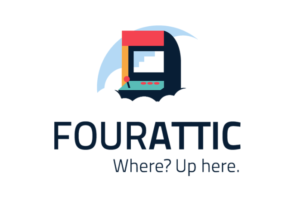
Fourattic is a relatively young company, but I imagine this isn’t the first stop for many of you in the gaming industry – what were you doing before coming together at Fourattic?
Juan Diego: All of us were studying in the university and we had some experience in working on companies related with our studies (computer science, marketing, art, and animation…) but when we started talking about creating Fourattic the country was going through one of the toughest economic crisis ever. Jobs were very poorly paid (if you had the luck of having a job…) and we were feeling the need of loving our jobs again so we quitted our jobs and started this “dream”.
I was coming from a year living and working in Australia so when we came back he felt like this was a perfect choice. Dani was working in a marketing company and he was fed up of spending hours in “heartless” projects so he didn’t need a second to think about quitting it. Juanga was working as a waiter and collaborating on several animation projects but he also felt like this was worth a shot. And it was practically the same with Fernando and Alfonso several months later… the team was mainly reunited and formed by people who were tired of their situations and needed to feel that they were working on something the truly love again…
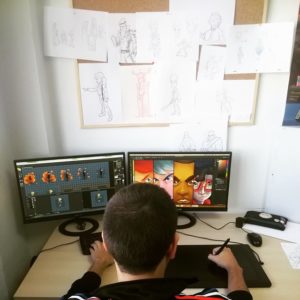
Hard at work making the magic of Crossing Souls happen!
The team at Fourattic is pretty small, isn’t that right? What’s it like working with such a close-knit team as opposed to working for larger companies/teams?
Juan Diego: Yes, as we told above the team was mainly formed by 5 members working in a small room and spending like 12h every day there: we used to breakfast, lunch and sometimes dinner all together. It was like being married to 4 people at once! (with all the good and bad that that entails! :P).
It’s totally different than working for larger companies where you might feel more closer to a number than a team member. Some of us had some previous experience on working in such big projects and we knew that feeling very well… and we wanted to avoid that from the very first moment we started.
During the process of creating the game we had several meetings and any member could contribute with his owns ideas and opinions, the team then used to discuss them and would do the best for the game. In the end, this is what it should be in an “indie game” right? We didn’t have the experience to make a AAA game so our main tool was pouring our heart and love into Crossing Souls and we can proudly say that the game has a part of each team member’s heart on it.
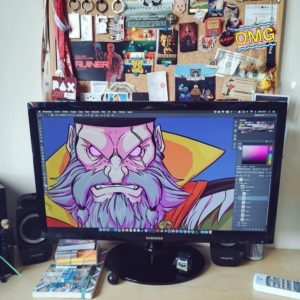
I absolutely LOVE the art style in this game!
Crossing Souls is not only the first featured title for Loot Play, but it’s also the first game developed and released by Fourattic – what was the journey like launching your first indie title?
Daniel: The road from Kickstarter to the release date of our first game has been a long one, but we have learned all the ins and outs of the industry and the trade in record time. Our first title has appeared on virtually every platform and has been translated into most major languages. We didn’t expect to make such a complete game, but the challenge came before us and we got down to work.
Now that it’s all over, the experience has certainly been worth it. We’ve had a unique experience, and maybe it won’t happen again. The first game will always be special for us. It’s like discovering a new world or the first time, we will never be the same as before this adventure.
Crossing Souls is just dripping with the best kinds of 80s nostalgia. What inspired the team to go with a more 80s themed atmosphere for Crossing Souls?
Daniel: We were born in Spain around 1985. It may seem that we are too young to be so influenced by the 80s, but in Spain, all these movies were coming to our televisions quite a few years late. So in the 90s, we grew up watching American or Japanese material from the previous decade. When we got down to work with brainstorming for the idea, it became evident that we were heavily influenced by films like E.T. the Extra-Terrestrial, Raiders of the Lost Ark, Hook…
So we decided to make a game about the eighties. But among our references were also movies like AKIRA, or Terminator, or Chihiro’s Journey… We have nuances that players will appreciate, beyond the eighties. We made the decision not only to make a revival but to add very relevant nuances to the story, to surprise the players. We wanted our own adventure, something unique with which to attack nostalgia in a renewed way and adapted to the new generations.
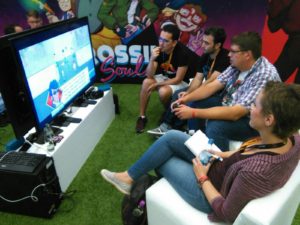
Some of the team getting a chance to show off the game during the Crossing Souls launch party!
I think Fourattic has an incredibly bright future in indie games – is there anything you can tease regarding upcoming projects?
Daniel: Well, we’re not currently working on any concrete ideas. We did Crossing Souls for the love of video games and great stories. We wanted to satiate our most creative part, and we did it. Right now, it’s just a matter of time and having an idea that has enough potential to bring us all back together around a table and start enjoying it. For us, that is the most important, perhaps the only thing that matters. Enjoying the process, so we’ll take the time to make that happen.
Indie gaming is something absolutely near and dear to my heart, and being a part of the Loot Play team has been such a privilege – what’s it like for the Fourattic team to be involved in the indie gaming scene?
Juanga: It’s an incredible thing, the indie gaming scene is a charming place that embraces you as a developer. We’re similar people and love the same things, games above all. As developers, we try to open our hearts and give to our public the best of us and the love we receive in return by the indie gaming scene is the best kind of reward we could ever ask for.
In your opinion, what sets indie gaming apart from the more mainstream triple-A world of gaming?
Juanga: Both are part of the entertainment industry, but we think that indies are more a kind of art than an industry. Maybe the first aim for an indie dev team is to make something different from the rest, to reach the public in a way triple-A games don’t do.
That about does it for me, any final thoughts you’d like to share with our fans?
Juanga: Yeah, of course, first of all, a huuuuuge, huuuuuuuuuugeeee thanks to them, for making the indie gaming community the wonderful place it is. It wouldn’t be the same without people like you!
Don’t forget to play that wonderful adventure we made, and keep playing awesome indie games!
